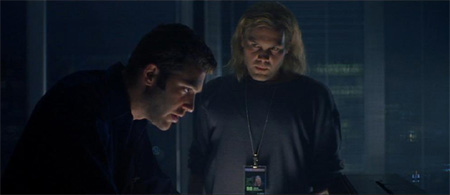The Thirteenth Floor (1999) 
“Question reality. You can go there even though it doesn’t exist.”

Director: Josef Rusnak
Cast: Craig Bierko, Gretchen Mol, Armin Mueller-Stahl
Synopsis: Computer scientist Hannon Fuller has discovered something extremely important.
WARNNG! This review contains SPOILERS!
Next to time travel, virtual reality is probably the theme that stimulates the imagination of writers the most, and the nature of both subjects allows their exploration to be as simple or as complex as the writer desires. While The Thirteenth Floor is not as well-known as its big brothers (The Matrix, ExistenZ, The Truman Show, etc) and was filmed on a far smaller budget ($16,000,000 — about a quarter of the budget for The Matrix), its intelligent treatment and complex plot give it the credentials to stand alongside all those films in terms of audience satisfaction.
Craig Bierko plays Douglas Hall, a computer software executive who, together with Hannon Fuller (Armin Mueller-Stahl) and Jason Whitney (Vincent D’Onofrio), has spent the past six years developing a computer-generated virtual world inhabited by people who think and feel like real humans. Unbeknownst to his co-workers, however, saucy old Fuller has been sneaking into the virtual world to enjoy a little rumpy with some of its more shapely creations, and has made a shattering discovery. Before he has a chance to tell Hall about it, however, he is brutally murdered, and Hall finds himself to be the chief suspect. To make matters worse, Hall has been suffering from bouts of amnesia and fears that he really may be the killer.
The Thirteenth Floor’s early scenes are perhaps a little more confusing than they need to be, but things soon begin to make sense once Fuller has been murdered and the nature of his work revealed. For a while, the story follows a traditional ‘did he-didn’t he’ murder-mystery formula before setting off in a different direction when Hall ‘jacks’ into the virtual world to track down a message Fuller has left there for him. Then, as the film progresses, the story becomes more and more complex, until both Hall and the audience come to a revelation (in a particularly well-handled, and curiously touching, sequence) that sets the movie off in yet another direction.
Oddly enough, it is at this point, just when the complexities of plot should be making the film more engrossing, that nagging questions begin to arise. Wouldn’t characters whose very existence has been proved to be fake, nothing more than a facsimile of real life created by a machine, respond with just a little more emotion than a single teardrop upon discovering the truth? Wouldn’t the multitude of virtual worlds that we learn are in existence be teeming with lecherous old men like Mueller-Stahl and maniacal mass-murderers like one of the other characters? And how would such a world possibly sustain any kind of order when the minds of its population are prone to be taken over by their users at any time, causing them to act completely out of character? While these may be minor infractions on the overall enjoyment of the movie, they are questions that distract you from what is happening on the screen. In addition, there are some major plot holes: why does Fuller leave his message to Hall in the virtual world — into which he can’t be sure Hall will even travel — instead of leaving it in the real world? Why didn’t the cop, McBain (Dennis Haysbert), check Hall’s answer-phone when he learned that Fuller had phoned him shortly before being murdered? Just how did Ashton get into the real world? Admittedly, such holes are a common fault of this type of movie — and are perhaps considered acceptable to the writers — but usually such flaws only come to mind in retrospect rather than at the moment the flaw actually occurs.
That said, The Thirteenth Floor is worth a look and will entertain, even with its flaws. Some might find the ending something of a let-down, but it is at least consistent with the events that have taken place prior to it, even if those events may have arguably been unfairly manipulated to make it so. The acting throughout is OK. Gretchen Mol, unfairly slated by some reviewers, actually gives a reasonable performance, and really does appear to be two different characters as she switches personas from sophisticated businesswoman to gum-chewing checkout girl. And, while Craig Bierko’s impossible good looks are a little on the bland side (I kept thinking I was watching Affleck), he gives a solid performance.
(Reviewed 4th October 2005)
httpv://www.youtube.com/watch?v=Xsl0-ON7P8A
